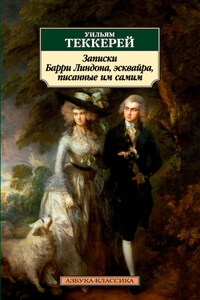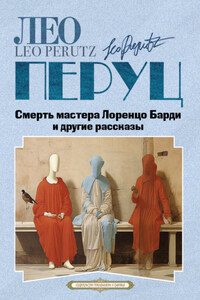“May she ever imitate the holy women of former times, and may the Evil One have no share in her actions.”
The nuptial blessing was droned monotonously in French by a stout rubicund priest, who wore soiled and crumpled vestments.
The scene was strange and impressive.
Upon a tawdry altar, in a small bare chapel, two candles flickered unsteadily. The gloomy place was utterly devoid of embellishment, with damp-stained, white-washed walls, a stone floor, dirty and uneven, and broken windows patched with paper.
Over the man and woman kneeling at the steps the priest outstretched his hands, and pronounced the benediction.
When he had concluded a gabbled exhortation and premonishment, they rose. The weary-eyed man regained his feet quickly, gazing a trifle sadly at his companion, while the latter, with a scarcely perceptible sigh, got up slowly, and affectionately embraced her newly-wedded husband.
As the bride placed her arms about her husband’s neck, he bent, and, lifting her black veil slightly, gave her a fond, passionate caress.
Turning from the altar, the priest grasped their hands, wishing them health and happiness. What bitter irony! what a canting pretence of humanity! As if either could be obtained in New Caledonia, the malarial island to which the French transport their criminals. The ill-timed sarcasm caused the statuesque warders to grin, but a tear stood in the eye of more than one of the bridegroom’s comrades in adversity, even though they were desperate characters, hardened by crime.
“We thank you heartily for your kind wishes,” he replied, “and trust that your blessing will render our lot less wearisome.”
The convict’s bride remained silent, gazing about her unconcernedly.
“Come,” exclaimed the officer, rising abruptly, “we must not linger; already we have lost too much time.”
After the register had been signed, the husband again kissed his wife. As she raised her lips to his, he whispered a few words, as if to reassure her, then said aloud —
“Farewell, dearest. In seven years I shall be free. Till then, au revoir, sans adieu!”
“Sans adieu!” she echoed in a low voice, apparently unmoved.
He shrugged his shoulders, and turned towards his stern guards.
“I must apologise for detaining you, gentlemen,” he said. “Let us go; I am ready.”
The bride, who was young, was dressed very plainly in black, yet with Parisian taste. Perhaps she was handsome, but the thick veil concealed her features. The husband’s appearance, however, was decidedly unprepossessing. He was undergoing a term of ten years’ hard labour and lifelong banishment.
Tall, bronzed, and bearded, with a thin face wrinkled by toil, although still retaining traces of good looks, he remained for a moment motionless, contemplating with loving eyes the woman who was now his wife. His attire was scarcely befitting a bridegroom, for he had no coat, and wore the soiled and ragged grey shirt and trousers of a miner, while the chains that bound his wrists seemed strangely out of place.
Yet the spectators of this odd ceremony were as strikingly incongruous as the principals themselves.
There were but eight persons. Five were fellow-prisoners of the husband, comprising the labour gang in which he worked, while close behind them sat an officer and two sinister-looking warders in faded military uniforms, the butts of their loaded rifles resting on the floor. The convicts were watching the ceremony interestedly, frequently whispering among themselves, and ever and anon, as either stirred, the clanking of their chains formed an ominous accompaniment to the hastily-gabbled formula, as if reminding them of the dismal hopelessness of their situation.
Neither replied. The warder who held the chain to which the five prisoners were manacled stepped forward, and locked it to the bridegroom’s fetters.
For a few minutes, while before the altar, the latter had been allowed comparative freedom, but now, the ceremony over, he was compelled to return with his gang to the atrocious tortures and dispiriting gloom of the copper mines – that monotonous, toilsome existence of French convicts; a life without rest, without hope, with naught else beyond hard labour, brutal taskmasters, and the whining homilies of drunken priests.
At a word from the officer the men filed slowly out, a dismal, dejected procession. Notwithstanding the uniform grey dress and closely-cropped heads, the difference in their physiognomy came prominently out. It was easily distinguishable that the husband belonged to a higher social circle than the others, who, from their ferocious, forbidding aspect, had evidently given the rein to their evil passions, and were undergoing their just punishment. Through the narrow door they passed in single file, the warders following immediately behind with their rifles upon their shoulders.
The officer paused at the door, and turning, lifted his cap politely to the bride, saying —
“Forgive me, madame, for thus taking your husband from you, but, alas! I have orders which must be obeyed.”














